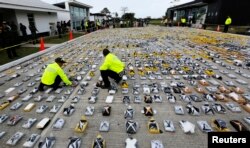Colombia on Thursday defended its anti-narcotics efforts after U.S. President Donald Trump said he considered downgrading the country in a White House assessment because of an uptick in the cultivation of coca, the base ingredient for cocaine.
Tens of millions of dollars in development and security funding and logistical help could be in danger should the United States decide the South American country is not doing enough, and such a decision could even jeopardize Colombia's access to monies from multilateral organizations.
The two countries have long been close allies in the fight against illegal narcotics, but in recent years have broadened the focus of their relationship to include trade and Colombia's peace process with leftist guerrillas.
However, Trump said this week he had contemplated declaring in the White House's annual review of countries it considers hubs for narcotics trafficking that Colombia is not meeting its drug fight obligations because of decade-high coca production.
The government of President Juan Manuel Santos took issue with Trump's statement.
"Colombia is without a doubt the country which most has fought drugs, and which has had the most success on that front," the government said in an early morning statement. "No one has to threaten us to confront this challenge."
In the last seven years, the country has confiscated 1,621 tons of cocaine, the statement said.
The United States has expressed its worry about a sharp uptick in coca cultivation and cocaine production at the close of last year, after Colombia signed a peace deal with the Revolutionary Armed Forces of Colombia (FARC), its largest rebel group, and halted the spraying of powerful herbicide glyphosate over health worries.
Coca cultivation was up to 188,000 hectares (464,000 acres), while cocaine production capacity climbed to 700 tons annually, the highest figures for at least a decade.
Colombia is counting on more than $400 million in funding help from the United States for implementing the FARC deal and has rejected the possibility of restarting fumigation with glyphosate, something Washington has backed.
Instead, Colombia favors manual eradication and crop substitution in concert with rural communities, as agreed upon in the FARC deal.
The country is planning to manually eliminate 50,000 hectares of coca.
Rebel groups, right-wing paramilitaries and crime gangs have all been involved in drug trafficking during Colombia's five-decade conflict, which has killed more than 220,000 people and displaced millions from their homes.






